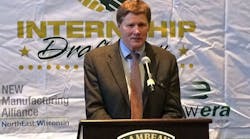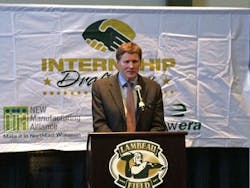Finding top talent is on every manufacturing executive’s mind. The skills gap is a very real thing, and job openings remain at or near record high levels, according to the U.S. Bureau of Labor Statistics. Several organizations are focusing their efforts on the job market and finding new talent to fill those positions.
NEW hires
The Northeast Wisconsin (NEW) Manufacturing Alliance (NEWMA) held its 3rd annual Internship Draft Day at Lambeau Field in Green Bay, Wisconsin, in early November. The event was co-sponsored by NEWMA and the Northeast Wisconsin Educational Resource Alliance (NEW ERA). More than 260 students from almost 20 Wisconsin and Michigan colleges had the opportunity to interview for 200 paid internships in engineering, business, IT, supply chain and electromechanical-related careers at 50 companies, such as Parker Hannifin, Werner Electric, Kohler and Jacobs Engineering.
“Internship Draft Day is an innovative approach to the college internship fair,” says NEWMA Director Ann Franz. Prior to the event, students received points for participation in college clubs, relevant work experience and their overall grade point averages. At the event, students received additional points for how well they interviewed.
Green Bay Packers President Mark Murphy
Two draft picks tied for the top spot. Andrew Splitt and Jeffrey Reinholtz, mechanical engineering and business administration co-majors from University of Wisconsin—Platteville, received their co-awards from Green Bay Packers President Mark Murphy.
“Our No. 1 overall draft pick was a tie,” explains Franz. “The two students are roommates, and each received a $1,000 scholarship for the 2018 spring semester. Interestingly, last year’s overall top draft pick was from UW—Platteville, as well.”
As part of the Internship Draft Day festivities, Parker Hannifin had sponsored a bus that took UW—Stout and Northeast Wisconsin Technical College (NWTC) students to the company’s Manitowoc facility for a tour prior to the event. “Unfortunately, the bus broke down on the return trip from Parker Hannifin to Lambeau Field,” explains Franz. “The students had to wait until another bus could come to pick them up. Good news. One of the students from NWTC ended up fixing the bus, so the students didn’t have to wait so long and were able to get to the event in time.”
Changing workforce
“The structural changes we’re seeing in the labor market are permanent,” says Chris Layden, vice president, ManpowerGroup. The technological revolution, the rise of client sophistication, greater individual choice and shifting demographics all have contributed irreversibly to the altered workforce landscape.
“Output per job has increased steadily over the past 30 years,” explains Layden. The manufacturing sector remains the largest and most dynamic sector of the U.S. economy at more than $6 trillion.
“There’s a war for talent,” explains Layden. “You are fighting for talent all around the world.” Forty percent of U.S. employers are having a hard time finding talent, according to Manpower’s research. The hardest job to fill in the United States is the skilled trades. According to Manpower’s recruitment difficulty index (RDI), 2 million manufacturing jobs will go unfilled by 2025 in the United States. Twenty-one percent of manufacturing workers will retire in the next eight years. But 75% of employers say new skills will be needed, and most employers don’t know yet what those skills are, says Layden.
“It’s not just about what to train for,” he says. “It’s the skills and the roles as they’re evolving. We partnered with the Digital Manufacturing and Design Innovation Institute (DMDII) and identified 165 potential roles, such as lifecycle digital twin architect and data management analyst. It’s important to see how the role of technicians has evolved. Helping people to ‘upskill’ and adapt to this fast-changing world of work will be the defining labor challenge of our time.”
Automation veterans
“Workforce development is the existential threat to the future of manufacturing,” says Blake Moret, president and CEO of Rockwell Automation. “Having people comfortably interacting with technology is important.”
Rockwell Automation reached across the Milwaukee skyline to partner with ManpowerGroup, a leader in workforce solutions, to create the Academy of Advanced Manufacturing, a program designed to “upskill” U.S. military veterans.
The program builds on Rockwell’s experience in automation training. “We know the curriculum and skills that are necessary,” says Moret. “Between 2003 and 2019, it’s estimated that 4.3 million veterans will leave the service, and 65% of them will need help finding employment outside the military. As we were working with the Department of Defense, we realized so many of the core work skills are already embodied in those veterans. Many of those skills could translate to the manufacturing environment.”
The program’s goal is to graduate 1,000 veterans per year by 2019. Over the past couple of decades, Rockwell Automation has graduated more than 7,000 engineers from its training program. “We thought we could take this show on the road and offer it to returning veterans,” says Moret. “Every veteran that goes through the Academy of Advanced Manufacturing is guaranteed a job. I was at the graduation ceremony of the first class of 14 last week in Cleveland. It was one of the single most rewarding things I’ve had the opportunity to do in my career.”
ALSO READ: Gilman Precision finds a good source for new, young employees
Mike Bacidore is the editor in chief for Control Design magazine. He is an award-winning columnist, earning a Gold Regional Award and a Silver National Award from the American Society of Business Publication Editors. Email him at [email protected].






